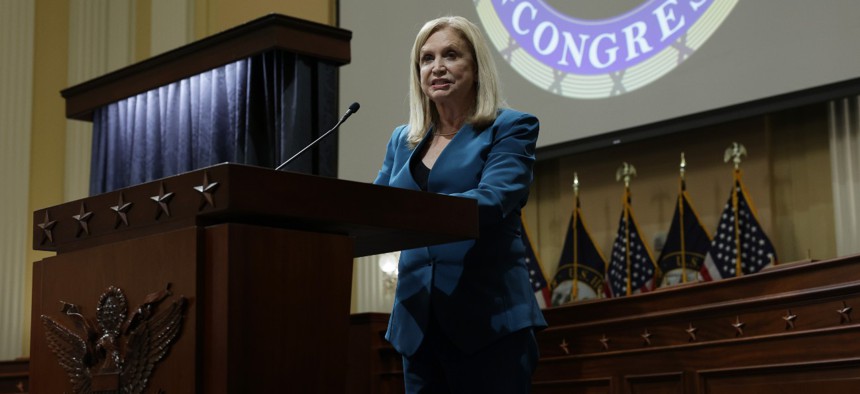
Rep. Carolyn Maloney, D-N.Y., chairwoman of the House Oversight and Reform Committee, said: “The critical bipartisan reforms included in this year’s defense bill will safeguard IG independence from political interference and strengthen congressional oversight of IGs.” Alex Wong/Getty Images
Inspector General Reforms Could Be on the Horizon
The negotiated version of the National Defense Authorization Act contains language to protect IGs from political interference and help them do their jobs better.
The negotiated version of the massive defense policy bill for fiscal 2023 contains provisions to boost the independence, effectiveness and integrity of the watchdog community.
The top Democrats and Republicans on the Senate and House Armed Services committees released the text of their agreement for the National Defense Authorization Act on Tuesday night. This is one of two must-pass pieces of legislation currently looming before the White House and Congress (the other being the government funding package) as the year comes to an end.
“Congress and the American people rely on inspectors general to provide rigorous, non-partisan assessments and audits at federal agencies, improving transparency and informing legislation,” Rep. Carolyn Maloney, D-N.Y., outgoing chairwoman of the House Oversight and Reform Committee, said in a statement to Government Executive on Wednesday. “The critical bipartisan reforms included in this year’s defense bill will safeguard IG independence from political interference and strengthen congressional oversight of IGs.” Maloney has introduced many IG reforms.
The authorization bill compromise text contains provisions that seek to increase transparency and accountability of investigations into IGs and operations of the Council of Inspectors General on Integrity Efficiency (and its integrity committee, specifically); ensure IGs are only removed for justiciable and compelling reasons (and Congress is notified); and limit who can serve as acting IGs. There are also stipulations for notifying Congress when an agency doesn’t provide requested information or assistance to an IG and providing more training opportunities for IGs.
In an effort to address persistent watchdog job vacancies, the bill’s text states: “If the president fails to make a formal nomination for a vacant inspector general position that requires a formal nomination by the president to be filled within the period beginning on the later of the date on which the vacancy occurred or on which a nomination is rejected, withdrawn, or returned, and ending on the day that is 210 days after that date, the president shall communicate, within 30 days after the end of such period and not later than June 1 of each year thereafter, to the appropriate congressional committees.”
According to Oversight.gov, 12 IG offices are currently lacking permanent leadership, seven of which require the president to nominate someone and the Senate to confirm the pick (three are currently pending before the Senate).
The section on IG reforms in the Defense authorization act “strengthens the IG community in several important ways,” Alan Boehm, executive director of the IG council, told Government Executive on Wednesday. “By strengthening our independence from the agencies we oversee, the reforms improve our ability to combat waste, fraud and abuse in federal programs. The legislation also includes welcome reforms to allow [the Council of Inspectors General on Integrity and Efficiency], and its integrity committee, to be more transparent and accountable to Congress.”
Boehm thanked the bipartisan group of lawmakers that “worked tirelessly to ensure these provisions were included in the NDAA,” naming Maloney and Rep. James Comer, R-Ky., ranking member of the House Oversight and Reform Committee, as well as Senate Homeland Security and Governmental Affairs Committee Chairman Sen. Gary Peters, D-Mich., and ranking member Sen. Rob Portman, R-Ohio.
Liz Hempowicz, vice president of policy and government affairs at the nonprofit Project on Government Oversight, said they are “really excited” for the IG provisions to be included in the authorization act as “Congress has been working on different versions of this language for years.”
Some of the most significant reforms are the provisions on the removal protections for IGs and limits on who can serve as acting IGs, Hempowicz told Government Executive. This was a subject of controversy under the Trump administration as were other matters involving IGs that the defense policy bill addresses.
One thing not included in the bill that POGO would like enacted is the ability for IGs to compel individuals from outside the agency, such as federal contractors or former officials, to comply with their investigations, Hempowicz said.
Two provisions included in only the House’s version of the authorization act that ultimately were not included in the compromise text are the creation of an Office of Inspector General for the Office of Management and Budget and the ability for the Justice Department IG to investigate allegations of misconduct by Justice Department attorneys, investigators and law enforcement personnel, as noted in the joint explanatory statement from the lawmakers on the Armed Services committees.







